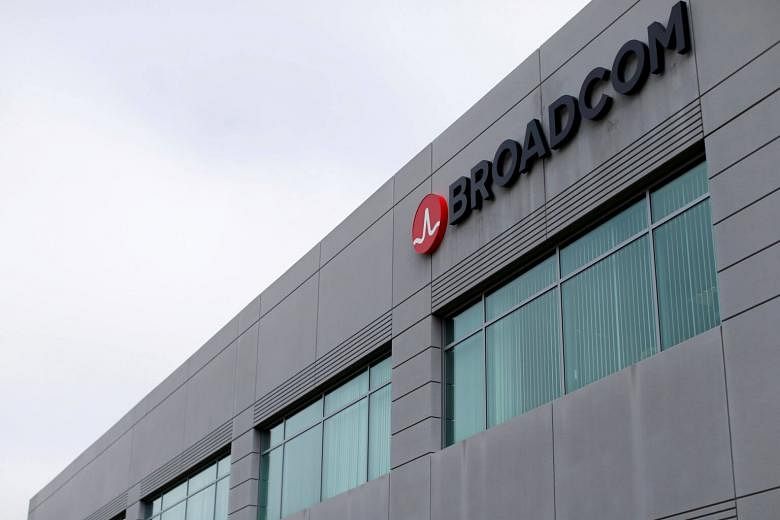SAN FRANCISCO • Perhaps no industry has more at stake than semiconductors in the trade war between the United States and China. For bulls who seem hell-bent on ignoring their vulnerability to the ongoing rift, faith keeps getting put to the test.
Broadcom gave investors a taste of a worst-case scenario last Thursday, chopping US$2 billion (S$2.74 billion) off its annual sales forecast. Chief executive Hock Tan said the firm is suffering from a "very, very sharp and rapid contraction" as a result of the trade uncertainty and the US ban on sales to Huawei Technologies, one of Broadcom's biggest customers.
Chipmakers fell last Friday, with the Philadelphia semiconductor index closing with a loss of 2.6 per cent. And yet, while Broadcom added to a drumbeat of bad news that drove the sector to its worst monthly decline in a decade last month, the industry is outperforming nearly every other group since US stocks bottomed last year. The 30-company gauge is up 27 per cent since Christmas Eve.
"The market is pricing in a deal and that these problems will go away" but that's a "fairy dust" scenario, said Northland Securities analyst Gus Richard. "Clearly, there is some risk factored into the market, but you could easily have another 20 per cent to 30 per cent pullback if the tariffs get slapped on and stay through August."
Another sign that the industry has yet to price in the trade risk is that analysts have been slow in lowering their estimates.
Since the US-China trade spat escalated last month, analysts have cut their forecasts at a rate that is half the pace seen for the broad market. Second-quarter profits will drop 31.7 per cent from a year ago, the latest analyst estimates compiled by Bloomberg showed. That is not far from the 30.6 per cent decline expected early last month. Either analysts are having a hard time quantifying the risk or they are not taking it seriously. Whatever the case, the reluctance sets up the market for potential shocks such as the one that sent Broadcom shares falling 5.6 per cent last Friday.
The trade dispute with China threatens a worldwide electronics supply chain where the country not only serves as one of the biggest end markets but also a major manufacturing hub. As the world's largest consumer of semiconductors, China accounts for more than half of the US$470 billion industry. With so much at stake, investors have not given up on chipmakers. They have been betting that slumping demand is poised to revive and China will be forced into a settlement because it is dependent on US-made components, said Bernstein analyst Mark Newman.
One reason stocks may be pricing in a quick fix is that this is a "headline-driven market", said Mr Michael Antonelli, managing director and market strategist at Robert W. Baird & Co. "The market doesn't know what to price, given that one tweet changes everything," he said in an interview.
Even if there is a quick resolution, the idea that things will return to normal is naive, according to New Street Research analyst Pierre Ferragu. US chipmakers may still be at risk of losing market share in China as the blacklisting of Huawei has prompted Chinese firms to focus the attention on reducing their dependence, he said. "China would get better at designing and manufacturing chips three times faster if they didn't have access to US technology. Survival is a great motivation factor."
BLOOMBERG

